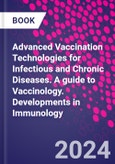Advanced Vaccination Technologies for Infectious and Chronic Diseases is a comprehensive guide that delves into the intricate details of vaccine design, development across various platforms, and the path to commercialization. This book provides an introductory overview of vaccines, covering various types, developmental methodologies, delivery systems, adjuvants, immunization, and measurement of vaccine efficacy. It also showcases examples of vaccine research efforts targeting infectious diseases, autoimmune disorders, and cancer. The book concludes by exploring cutting-edge advances in proteogenomics, immunopeptidomics, and future vaccine technologies.
The primary objective of this book is to inform a broad scientific audience about the fundamental concepts underlying vaccine and immunology. Further, it serves as an invaluable reference for understanding the critical steps in the journey from discovery to regulatory processes for human clinical trials, addressing common misconceptions and presenting factual information about vaccinations. Advanced Vaccination Technologies for Infectious and Chronic Diseases is a requisite reference for occupational health professionals whose roles involve supervision of immunization programs such as those working within the National Health Service, some sectors of higher education, or the pharmaceutical industry. It also caters to those researchers engaged in vaccine development and all who want to learn the processes involved from laboratory research to final product.
Please Note: This is an On Demand product, delivery may take up to 11 working days after payment has been received.
Table of Contents
1: History of Vaccination2: Vaccine Adjuvants and carriers
3: Conventional vaccination methods: Inactivated and Live attenuated vaccines
4: Subunit protein based Vaccines
5: Peptide based vaccines and altered peptide ligands: Multiple Sclerosis paving the way
6: Vector based vaccine delivery and associated immunity: Current Status and Way Forward
7: It's all about the delivery: How to augment the efficiency of DNA vaccination
8: Plant-based biotechnological vaccines for emerging infectious diseases
9: Expression system and purification process for the vaccine production
10: Targeting dendritic cells for antigen delivery for vaccine design
11: Parenteral Vaccine delivery: from basic principles to new developments
12: Mucosal Vaccine delivery
13: Personalized vaccines, novel vaccination technologies and future prospects
14: The application of nanoparticle-based delivery systems in vaccine development
15: Preclinical and clinical development for vaccines and formulations
16: Regulatory processes involved in clinical trials and IPR around vaccine development
17: Vaccine safety, efficacy, and ethical considerations
18: Regulatory consideration and pathways for vaccine development
19: New approaches to vaccines for infectious diseases
20: New approaches to vaccines for cancer
21: New approaches to vaccines for autoimmunity
22: The fast-track development COVID-19 vaccines
23: Myths and Facts about Vaccination: Dispelling Myths and Misconceptions with Science
24: Proteogenomics and immunopeptidomics in the development of advanced vaccines
25: Future Vaccine Technologies
Authors
Vasso Apostolopoulos Distinguished Professor, School of Health and Biomedical Sciences, RMIT University School of Health and Biomedical Sciences.Professor Vasso Apostolopoulos is a Distinguished Professor at RMIT University, Australia. She received her PhD in immunology in 1995 from the University of Melbourne and the Advanced Certificate in Protein Crystallography from Birkbeck College, University of London. Professor Vasso Apostolopoulos is a world-renowned researcher who has been recognized with over 100 awards for the outstanding results of her research. She has published over 500 research publications, 8 books, and 33 book chapters, is a sought-after keynote speaker at conferences, is an inventor on 21 patents, and has over 22,000 citations.
Lalitkumar K. Vora Lecturer, School of Pharmacy, Queen's University, Belfast, UK.Dr. Lalitkumar K. Vora is a Lecturer at the School of Pharmacy, Queen's University, Belfast, and was included in Stanford's top 2% of world scientists list in 2023.
Vivek P. Chavda Assistant Professor, Department of Pharmaceutics and Pharmaceutical Technology, L M College of Pharmacy, Ahmedabad, Gujarat, India. Vivek P Chavda is an Assistant Professor (Selection Grade), Department of Pharmaceutics and Pharmaceutical Technology, L M College of Pharmacy, Ahmedabad, Gujarat, India. He is B Pharm and M Pharm Gold medalist at Gujarat Technological University. Before joining to ac?ademics, he served to Biologics industry for almost 8 years in the Research and Development of Biologics with many successful regulatory filings. He has more than 170 peer?reviewed national and international publications, 18 book chapters, 10 book chapters under communication, 1 patent in pipeline, and numerous newsletter articles to his credit. His research interests include development of biologics process and formulations, medical device development, nanodiagnostics and noncarrier formulations, long-acting parenteral formulations, and nanovaccine







